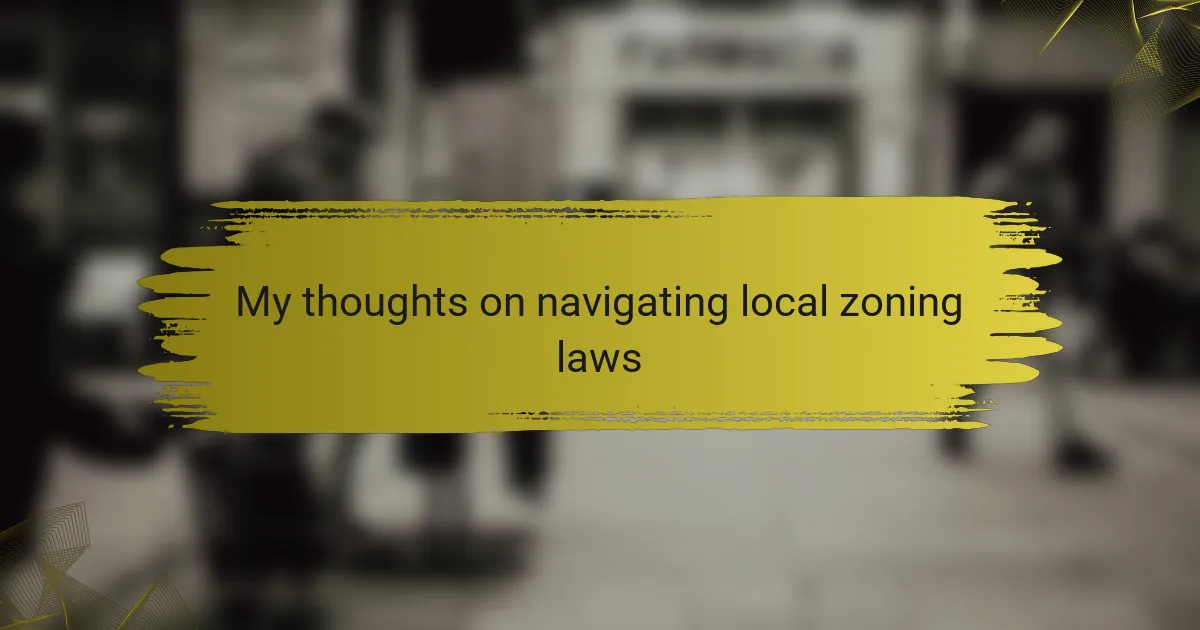Key takeaways
- Understanding local zoning laws is essential for launching an independent radio station, as they dictate location, signal strength, and equipment usage.
- Engaging with local zoning officials and building networks can simplify the navigation of complex zoning regulations and enhance community support.
- Different zoning classifications—residential, commercial, and industrial—significantly impact broadcasting capabilities and community engagement.
- Reliable resources, such as local government websites and community planning organizations, can clarify zoning laws and aid in decision-making for aspiring broadcasters.
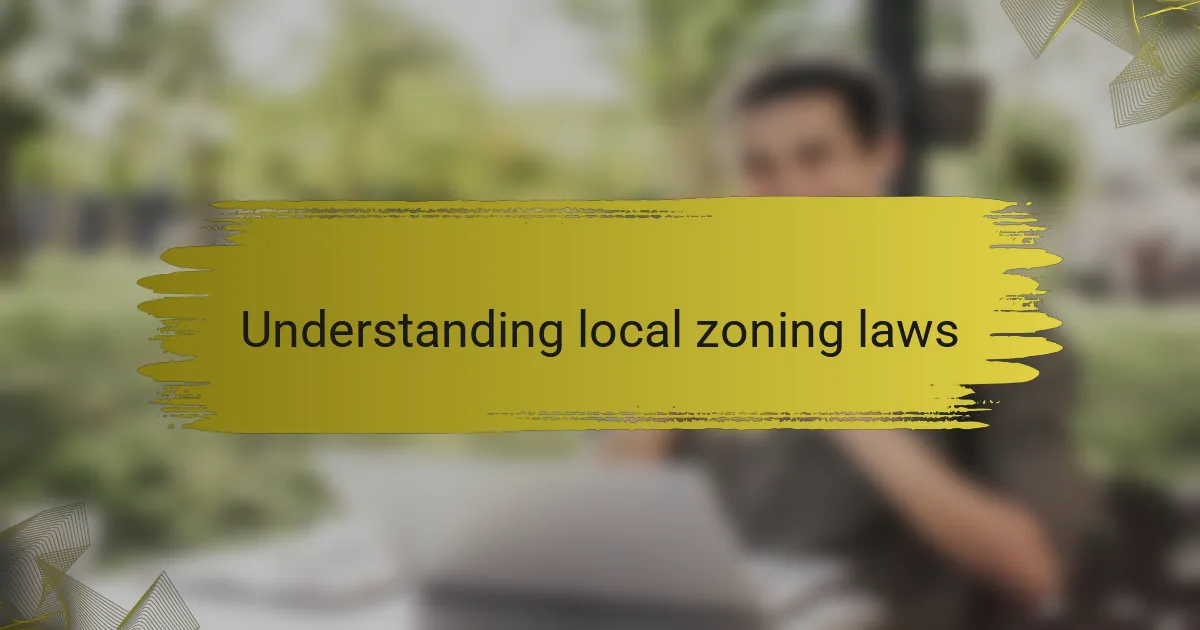
Understanding local zoning laws
Understanding local zoning laws is crucial for anyone interested in setting up an independent radio station. These laws dictate how land can be used in your area, impacting everything from the location of your broadcast tower to the kind of equipment you’ll be able to use. I remember when I first navigated through these regulations; it felt overwhelming, but breaking it down into manageable parts made the process much smoother.
Zoning laws can vary significantly from one municipality to another, affecting factors like signal strength and transmission range. This variation highlights the importance of researching specific zoning ordinances in your location. I found that connecting with local zoning offices and seeking advice from others in the radio industry greatly simplified my experience and helped me make informed decisions.
Here’s a quick comparison of different zoning classifications that can affect radio station operations:
| Zoning Classification | Impact on Radio Stations |
|---|---|
| Residential | Often restricts broadcasting to prevent interference with local households. |
| Commercial | Allows for more flexibility with broadcasting equipment and signal strength. |
| Industrial | May offer the best options for high-power transmissions and tower placements. |

Importance of zoning for radio media
Understanding the importance of zoning for radio media is crucial for any independent station. Zoning laws affect where and how we can operate, shaping not just our broadcast reach, but also our community engagement. For instance, when I was applying for a license, I found that certain zones had restrictions that could hinder our ability to share local music and stories, which was disheartening.
Here’s a quick comparison table that highlights some key aspects of zoning laws in relation to radio media:
| Zoning Aspect | Impact on Independent Radio |
|---|---|
| Frequency Allocation | Determines available broadcasting frequencies and can limit stations’ reach. |
| Licensing Requirements | Affects the complexity and cost of starting and operating a station, influencing diversity in programming. |
| Community Engagement | Encourages collaboration with local organizations, but can limit visibility based on location. |
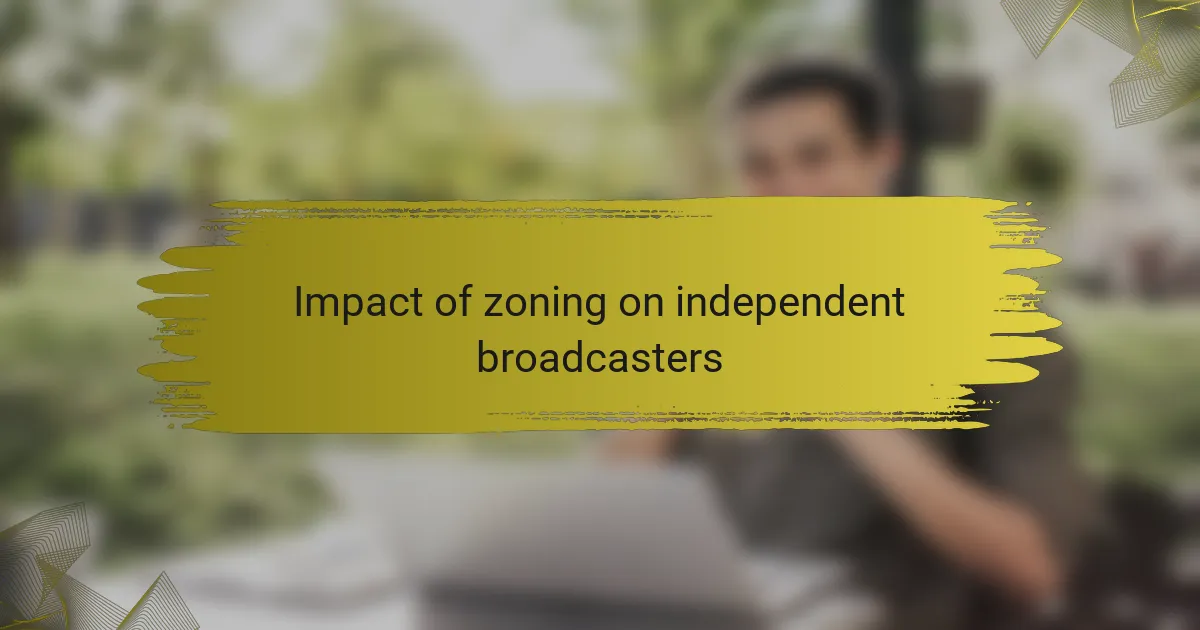
Impact of zoning on independent broadcasters
Zoning laws play a crucial role in shaping the landscape for independent broadcasters. Many times, I’ve seen how a well-planned zoning strategy can create a supportive environment for local media to thrive. However, on the flip side, overly restrictive zoning can stifle creativity and limit the reach of diverse voices in the broadcasting arena.
Additionally, navigating these laws often feels like a maze. I remember a time when I was frustrated by the nuances of a local zoning regulation that impacted a small radio station’s ability to expand its services. It’s vital for independent broadcasters to engage with local authorities and advocate for their needs, ensuring that zoning supports rather than hinders their mission.
Here’s a quick comparison of how zoning impacts independent broadcasters versus larger media companies:
| Aspect | Independent Broadcasters | Larger Media Companies |
|---|---|---|
| Flexibility | Limited due to strict zoning | More leverage to negotiate |
| Community Engagement | High, focused on local issues | Lower, often broader focus |
| Resource Access | Scarce, reliant on local support | Abundant, extensive networks |
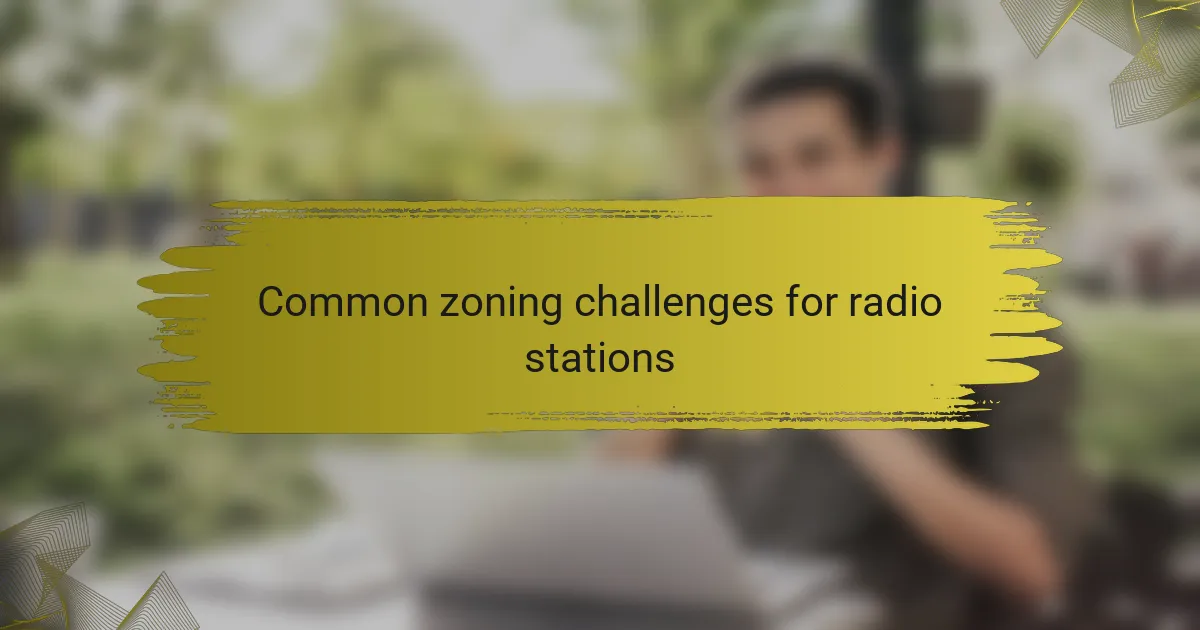
Common zoning challenges for radio stations
Zoning challenges for radio stations often stem from the residential classifications that many municipalities impose. When I explored potential sites for my station, I faced regulations that limited our broadcasting abilities, such as restrictions on signal strength and tower height. It made me wonder—how could we cultivate a community voice if we weren’t even allowed to reach our neighbors?
Another common hurdle is navigating the complex licensing requirements that come with zoning laws. I recall spending countless hours sifting through paperwork and approvals, sometimes feeling like I was running in circles. It’s frustrating to think that these bureaucratic processes could dictate how accessible our content is to the community we aim to serve.
Moreover, local zoning offices can be a mixed bag in terms of support. While some officials are incredibly helpful, I’ve encountered those who seem unaware of the unique needs of radio stations. Have you ever tried to explain your vision to someone who just doesn’t get it? It can leave you feeling a bit lost, yet it emphasizes the need for ongoing dialogue between local broadcasters and zoning authorities.
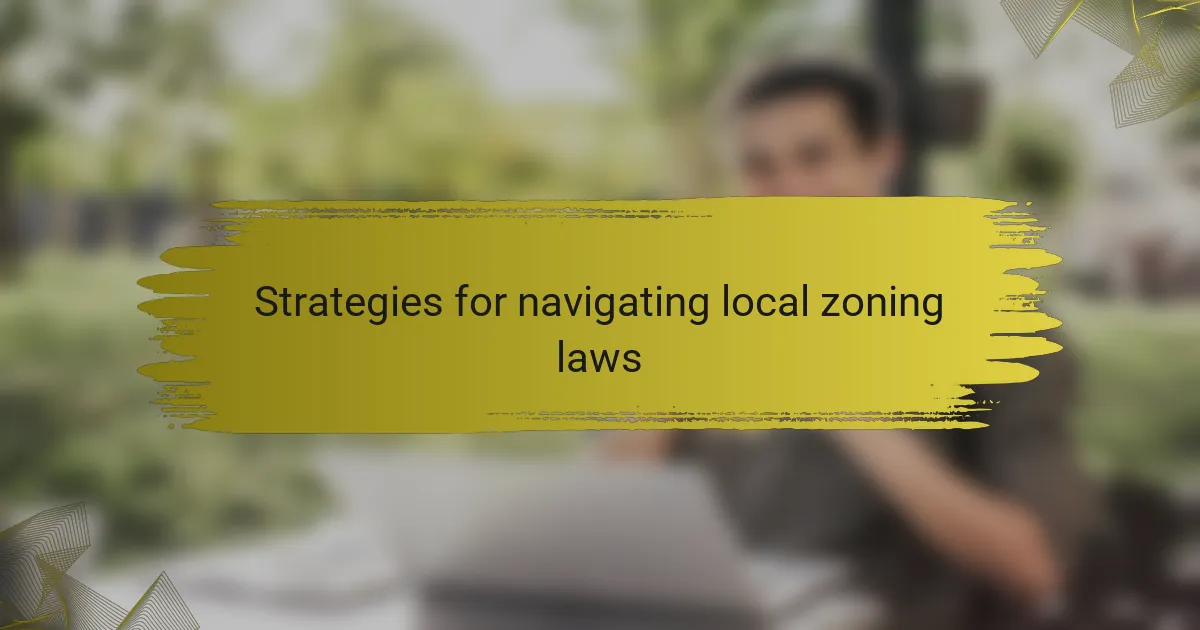
Strategies for navigating local zoning laws
Navigating local zoning laws can feel overwhelming, especially when you’re trying to launch an independent radio project. I remember spending countless hours pouring over regulations, only to find that many were written in dense legal jargon. It’s essential to take it step-by-step and seek help when needed, whether from local officials or community organizations.
One effective strategy I found is building relationships with local zoning officials. A friendly conversation can clarify murky rules and potentially expedite the approval process. Additionally, connecting with other media professionals in your area can also provide insights and shared experiences that can be incredibly useful.
- Research your local zoning regulations thoroughly. Look for community resources that explain zoning laws in layman’s terms.
- Attend zoning board meetings to gain firsthand insights and make your presence known.
- Network with other independent media professionals who might share tips and personal stories about their experiences.
- Seek mentorship from someone who has successfully navigated local zoning laws before.
- Consider working with a local attorney specializing in zoning issues if things become too complex.
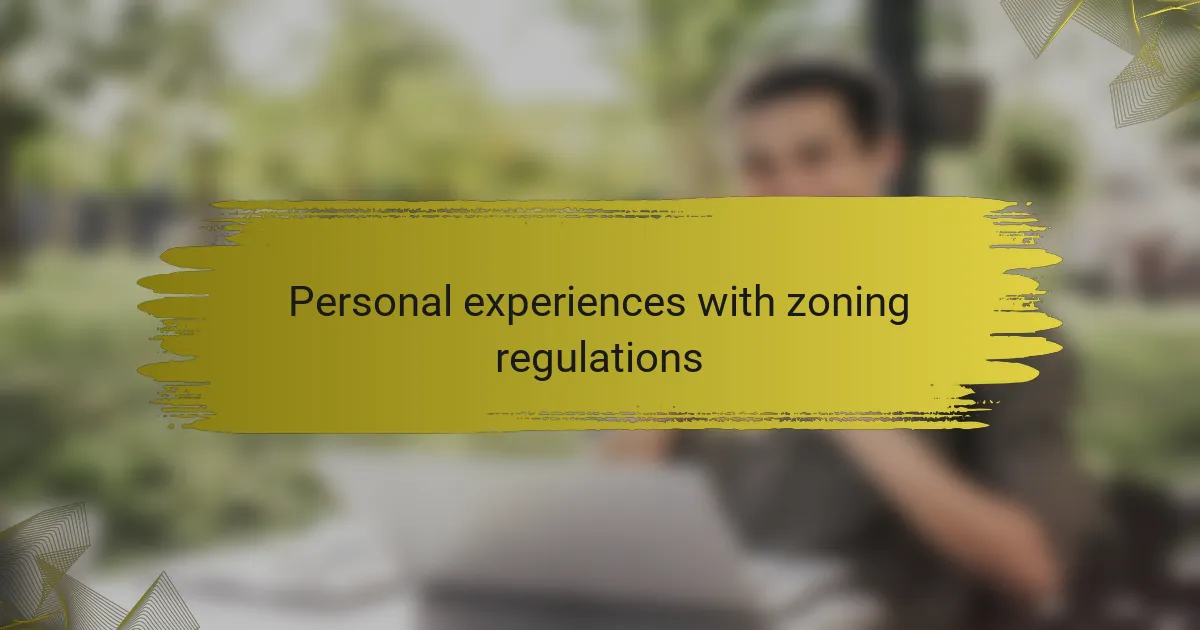
Personal experiences with zoning regulations
Navigating local zoning regulations can be a daunting experience, especially for independent media startups. I remember the stress I felt when my first radio project faced unexpected zoning challenges. I had to learn quickly what the local laws permitted, or risk jeopardizing my dream.
In one instance, I found out that my chosen location was zoned for residential use only, which meant no commercial broadcasting was allowed. It was a frustrating setback, but it taught me the importance of thorough research. Understanding the nuances of zoning laws not only saved my project but also turned into a valuable lesson about diligence and persistence.
Here’s a quick comparison of how different zoning classifications can impact independent radio initiatives:
| Zoning Type | Impact on Radio Operations |
|---|---|
| Residential | Typically restricts broadcasting, requiring special permits |
| Commercial | Allows for broadcasting without additional permits, fostering growth |
| Mixed-Use | Potentially supportive of small media ventures, facilitating community engagement |

Resources for further zoning insights
When diving into local zoning laws, having reliable resources can make all the difference. I remember feeling overwhelmed during my first engagement with zoning regulations, but uncovering a few key resources helped clarify the landscape for me. Whether you’re considering setting up a community radio station or simply want to understand the regulations better, these resources can guide you toward informed decisions.
Here’s a list of valuable resources that can enhance your understanding of zoning laws:
- Local government websites: Often have detailed zoning maps and regulations.
- Community planning organizations: Provide tools and guides tailored to local zoning issues.
- Legal aid clinics: Help navigate complexities with professional guidance, often offering free consultations.
- Online forums: Platforms where you can discuss experiences and gather insights from others in similar situations.
- Books on zoning laws: Consider titles that break down the subject into digestible concepts, making it easier to grasp the essentials.
